- Home
- Harry Harrison
In Our Hands the Stars Page 11
In Our Hands the Stars Read online
Page 11
“No, of course not.”
“Sorry to bother you. But you know how it is. This kind of thing would never happen at home. But an American, living abroad, always a lot of paperwork.” He tapped the passport on his blotter but made no attempt to return it.
“My home is here,” she said, defensively.
“Of course. Figure of speech. After all, your husband is Danish. Even though you are still an American citizen.”
He smiled at her, then looked out of the window at the rain. She clasped her hands tightly on top of her purse and did not answer. He turned back, and she realized that the smile was empty, not sympathetic or friendly. Not anything. A prop just like the glasses that gave him that owlish intellectual look.
“You must be a loyal American citizen,” he said, “because you have never considered giving up your citizenship even though you are married—seven years, isn’t it?—to a citizen of a foreign country. That’s true, isn’t it?”
“I—I don’t think much about these things,” she said in a very small voice, wondering as she spoke. Why didn’t she tell him to mind his own business? Take her passport and get out of here? Perhaps because he spoke aloud what she had always known and never mentioned to anyone.
“There’s nothing to be ashamed of.” The smile came on again. “Loyalty to one’s country may be old-fashioned, but there is still something fine about it. Don’t let anyone tell you different. There is nothing at all wrong in loving your husband, as I’m sure you do, and being married to him—yet still keeping your God-given American citizenship. It’s something they can’t take away from you, so don’t ever give it up.” He made his points sternly, tapping the passport on the desk as he did so.
She could think of nothing to answer, so remained silent. He nodded, as though her silence were some kind of consent.
“I see by the papers that your husband actually flew that Daleth-drive ship to the Moon. He must be a brave man.”
She had to at least nod agreement to that.
“The world is looking to Denmark now, for leadership in the space race. It’s sort of funny that this little country should be ahead of the United States. After all the billions that we have spent and after all the brave men who have died. A lot of Americans don’t think that it’s fair. After all, it was America that freed this country from the Germans, and it’s American money and men and equipment that keeps NATO strong and defends this country against the Russians. Maybe they have a point. The space race is a big thing and little Denmark can’t go it alone, don’t you agree?”
“I don’t know, really. I suppose they can….”
“Can they?” The smile was gone. “The Daleth drive is more than a space drive. It is a power in the world. A power that Russia could reach out a few miles and grab, just like that. You wouldn’t like that to happen, would you?”
“Of course not.”
“Right. You’re an American, a good American. When America has the Daleth drive there will be peace in the world. Now I’ll tell you something, and it’s confidential so you shouldn’t go around mentioning it. The Danes don’t see it in the same way. Certain left-wing factions in the government here—after all they are socialists—are keeping the Daleth material from us. And we can imagine why, can’t we?”
“No,” she said defensively. “Denmark isn’t like that, the people in government. They have no particular love for the Russians. There is no need to worry.”
“You’re a little naive, like most people, when it comes to international Communism. They are in everywhere. They will get this Daleth drive away from the free world if we don’t get it first. You can help us, Martha.”
“I can talk to my husband,” she said quickly, a cold feeling of dread in her chest. “Not that it would do much good. He makes up his own mind. And I doubt if he can influence anyone …” She broke off as Baxter shook his head in a long, slow no.
“That is not what I mean. You know all of the people involved. You visit them socially. You have even visited the Atomic Institute—”
“How do you know that?”
“—so you know a good deal more about what is happening than anyone else not formally connected with the project. There are some things I would like to ask you—”
“No,” she said breathlessly, jumping to her feet. “I can’t do it-what you are asking. It’s not fair to ask me. Give me my passport, please, I must go now.”
Unsmiling, Baxter dropped the passport into a drawer and closed it. “I’ll have to hold this. Just a formality. Check the number against the records. Come back and see me next week. The receptionist will make an appointment.” He went to the door ahead of her and put his hand on the knob. “We’re in a war, Martha, all over the world. And all of us are front-line soldiers. Some are asked to do more than others, but that is the way wars are. You are an American, Martha— never forget that. You can’t ever forget your country or where your loyalties lie.”
14
There was something final about cleaning out his locker that depressed Nils. Number 121 in Kastrup airport, it had always been his, no one else’s. When they had enlarged this section and built the new lockers he, as Senior Danish Pilot, had of course had first pick. Now he was emptying it. No one had asked him to, but when he had stopped off to pick up the boiler suits he had stowed here, he had realized, that he no longer had any right to the locker. In all fairness he should let someone else use it. As quickly as possible he stuffed all the accumulated odds and ends of the years into the flight bag and zipped it shut. The hell with it. He slammed the door shut and stamped out.
In the hallway he suddenly realized that someone was calling his name and he looked about.
“Inger!”
“None other, you big ape. You have been flying too much without me. Isn’t it time you hired a good hostess for your Moon trips?”
She strode toward him, long-legged, willowy. A good hostess indeed, a walking advertisement for SAS. Her skirt was short, her jacket round and tight-fitting, her little cap perched at a jaunty angle on her ash-blond hair. She was the tired traveler’s dream of a hostess, bigger than life size, almost as tall as Nils, a vision from a Swedish film. And almost incidentally, the best and most experienced hostess the airline had. She took his hand in both of hers, standing very close.
“It’s not true, is it?” she asked. “That you’re through with flying?”
“I’m through with SAS, at least for now. Other things.”
“I know, big hush-hush stuff. This Daleth drive. The papers are full of it. But I can’t believe that we won’t ever fly together again!”
As she said it she leaned even closer and he could feel the tall warmth of her against his side, the roundness of her breasts pushing against his arm. Then she leaned back, knowing better than to show anything more in public.
“God, how I wish we could!” he said, and they both laughed aloud at the sudden hoarseness of his voice.
“The next time you are out of the country let me know.” She looked at her watch and dropped his hand. “I have to run. A flight out in an hour.”
She waved and was gone, and he went the other way. Walking with the memory of her. How many countries had it been? Sixteen, something like that. The very first time she had flown on his crew they had ended up in bed together by mutual and almost automatic decision. It had been New York City in the summer, an exhaust-fumed and sooty inferno just on the other side of the window. But the blinds on the hotel-room window had been closed and the air conditioner hummed coolly and they had explored each other with sweet abandon. There had been no guilt, just a pleasurable acceptance without past or future. He scarcely thought about her when she wasn’t present, and neither was jealous of the other. But when they did meet they had a single thought.
It was after a particularly enjoyable night on a singularly lumpy mattress in Karachi that they had first started to figure out how many cities they had made love in. They were exhausted, mostly with laughing, because Nils had bought her a boo
k of photographs of erotic temple carvings. They had tried some of the more exotic postures—the ones that did not need three or four others to help—chortling too much to really accomplish anything. They had lain there afterward and had had a not too serious argument about just how many cities it really had been. After this they began to keep track. Nils then used his seniority to bid for different runs so they could be together, adding new cities to the lengthening list. But never Copenhagen, or even Scandinavia, never at home. There was an entire world out there that they shared. This was his home and it was something different. It was an unspoken rule that they knew about but never discussed. He pushed open the door to the main terminal and growled deep in his throat.
A girl’s voice on the public address system announced departing flights in a dozen languages. Danish and English for every flight, then the language of the country of destination: French for the Paris flight, Greek for the Athens plane, even Japanese for the Air Japan polar flight to Tokyo. Nils, worked through the crowds to the nearest TV display of arrivals and departures. There was a shuttle flight leaving soon for Malmo, just across the Sound in Sweden, that would do fine. Skou was always finding new ways to elude any possible attempt to follow them, and this was his latest device. A good one too, Nils had to admit.
He waited in the main hall until just two minutes before departure time. Then he went through the administrative part of the building, where passengers were not allowed. This should have shaken any possible tails. A few people greeted him, and then he was out on the tarmac just as the final passengers were boarding the Malmo flight. He was the last one in, and they closed the door behind him. The hostess knew him—he didn’t even have to show her his pass—and he went up and sat on the navigator’s chair and talked shop with the pilots during the brief hop. When they landed, the hostess let him out first and he went directly to the parking lot. Skou was there, behind the wheel of a new Humber, reading a sports newspaper.
“What happened to that gamle raslekasse you always drive?” Nils asked, sliding in next to him.
“Old rattling tin can indeed! It has thousands of kilometers left in it. It happens to be in the garage for a little work …”
“Jacking up the steering wheel to build a new car underneath!”
Skou snorted through his nostrils and started the engine, easing out of the lot and heading north.
Once clear of the city, the coast road wound up and down between the villages, revealing quick glimpses of the Sound, on their left, seen through the trees. Skou concentrated on his driving, and Nils had little to say. He was thinking about Inger, erotic memories, one after another, something new for him. He normally lived the moments of existence as they came, planning only as far ahead as was necessary, forgetting the past as something long gone and unalterable. He missed flying, that was for certain, realizing now that this had been the biggest element of his life around which everything else turned. Yet he had not flown an airplane since … when? Before the Moon flight. It seemed that he had been buried in offices and that filthy shipyard for years. The short flight from Kastrup had only teased him. A passenger.
“Here,” he called out suddenly. “Let me drive a bit, Skou. You can’t have all the fun.”
“This is a government car!”
“And I’m a government slave. Let’s go. I’ll report you to your superiors for getting drunk on the job if you don’t let me.”
“I had one beer with lunch—and a flat Swedish beer at that. I ought to report you for blackmail.” But Skou pulled up anyway and they changed seats. He said nothing when Nils put his foot flat on the floor and screamed the engine up through the gears.
There was hardly any traffic on the road and the visibility was good, with the setting sun trying to get through the clouds. The Humber cornered like a sports car, and Nils was an excellent driver, going fast but not taking chances. Machines were something he knew how to cope with.
It was almost dark when they reached Hälsingborg and bumped over the railroad tracks to the ferry terminal. They began a new lane and were the first car aboard the next ferry, stopping right behind the folding gate at the bow of the ship. Skou got on line to buy a package of tax-free cigarettes during the brief crossing, but Nils stayed in the car. The drive, short as it was, had helped. He watched the lights of the castle and the Helsingør harbor come close and thought about the work that was nearing completion on Galathea.
The guard at the shipyard gate recognized Skou and waved them through.
“How is security?” Nils asked.
“Secrecy is the best security. So far the spies have not connected the much-publicized hovercraft with the highly secret Daleth project. So the guards stationed here—and there are enough of them—are not in evidence. You saw one of them, selling hot dogs from that cart across the street.”
“The pølsevogn! Does he get to keep his profits?”
“Certainly not! He’s on salary.”
They parked in their usual spot behind the buildings, and Nils used the office to change into his boiler suit. The yards were silent, except for the work going on around the Galathea which continued on a twenty-four-hour basis. Arc lights had been switched on, lighting up the rusted, unfinished hull. This was deliberate subterfuge: the sandblasting and painting was being put off until the very last moment.
Inside, it was very different. They climbed the ladder and entered through the deck airlock. The lights came on when the outer door was closed. Beyond the inner door stretched a white corridor, linoleum floored, walled with teak paneling. The lighting was indirect and unobtrusive. Framed photographs of the lunar landscape were fastened to the walls.
“Pretty luxurious,” Nils said. On his last visit the corridor-had been red-painted steel.
“Most of it is from the original specifications,” Ove Rasmussen said, coming in behind them. “All of the interior was designed and contracted for. There had to be some changes, of course, but in most of the cabins and general areas there was very little. They filed away the pictures of castles and thatched houses and put up these Moon shots instead. These are the prints the Soviets sent in gratitude. Come with me, I have a surprise for you.”
They went along a carpeted passage lined with cabin doors. Ove pointed to the last one and said, “You first, Nils.” There was a brass plate let into the teak of the door that read Kaptajn. Nils pushed it open.
It was large, part office and part living room; with a bedroom opening off of it. The dark blue carpet was flecked with a pattern of tiny stars. Over the desk, which was an ultra-modern palisander-and-chrome construction, were mounted a bank of instruments and a row of communicators.
“A little different from flying SAS,” Ove said, smiling at Nils’s wide-eyed appreciation. “Or even the Air Force. And look there, your first command, in true nautical tradition.” Over the couch was a large color photograph of the little submarine Blaeksprutten sitting on the lunar plain. The distant Earth showed clearly in the background.
“Another gift from the Soviets?” Nils laughed. “It’s all tremendous.”
“Personal present from Major Shavkun. He took it before they came over, you remember. See, all three of them have signed it.”
“A little paint on the outside and Galathea looks ready to go. Is it? How does the drive department progress?”
“The fusion generator is aboard and has been tested. A lot of small items are still to be taken care of—nothing important, silverware, things like that. And the Daleth drive, of course. It’s built and has been bench tested at the institute, and it will go in last.”
“The very last thing,” Skou said. “We want to put as little temptation in the way of our spies as is possible. We have the university under a heavy military guard, so I imagine they are focusing their interest there.” He smiled broadly. “All of the hotels are full. They bring in plenty of foreign exchange. It is a new tourist industry.”
“And you’re in security heaven,” Nils said. “No wonder you are driving a new Humbe
r. Where is Arnie Klein?”
“He has been living aboard for the last couple of weeks,” Ove said. “Ever since the bench tests were completed on the Daleth unit. He has been working with my fusion generator and, I swear, he has already made at least five patentable improvements.”
“Let’s get down there. I want to see my engine room.” He looked around once more, admiringly, before he closed the door behind them. “All of this takes a bit of getting used to. It is beginning to be a bigger job than I ever realized.”
“Relax,” Ove told him. “It’s a ship now, but it is going to be a big flying machine once you lift off. Sort of a super seven forty-seven—which I know you have flown. You’ll agree that it is a lot easier to teach you to fly a ship than it is to teach a ship’s captain to fly anything at all.”
“There is that. What’s wrong?”
Skou had stopped dead, nostrils flared with anger.
“The guard, he should be there in front of the engine-room door. Twenty-four hours a day.” He began to run heavily, with a bobbing motion, and pushed against the door. It would not open.
“Locked from the inside,” Nils said. “Is there another key?”
Skou was not wasting time looking for a key. He drew a short thick-barreled revolver from a holster inside the waistband of his trousers and jammed it against the lock. It boomed once and jumped in his hand. Smoke billowed out and the door opened. Just a few centimeters, something was blocking it. Through the opening they could see the blue-clad legs of the guard on the floor just inside, his body pressing against the door. He slid along, unprotesting, when they pushed harder to get the door open.
“Professor Klein,” Skou called, and jumped in over the guard’s body. Three rapid shots boomed out and he kept on going, falling to the floor. He had his gun raised but did not return the fire. “Stay back,” he called to the other two, then climbed to his feet.

 Arm of the Law
Arm of the Law The Velvet Glove
The Velvet Glove The K-Factor
The K-Factor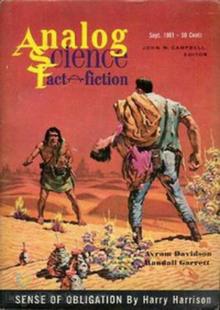 Sense of Obligation
Sense of Obligation Deathworld: The Complete Saga
Deathworld: The Complete Saga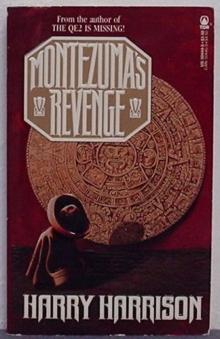 Montezuma's Revenge
Montezuma's Revenge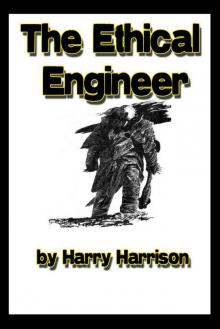 The Ethical Engineer
The Ethical Engineer The Stainless Steel Rat Returns
The Stainless Steel Rat Returns The Misplaced Battleship
The Misplaced Battleship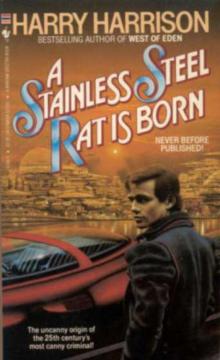 The Stainless Steel Rat is Born
The Stainless Steel Rat is Born Planet of the Damned bb-1
Planet of the Damned bb-1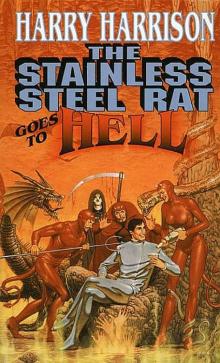 The Stainless Steel Rat Goes to Hell ssr-10
The Stainless Steel Rat Goes to Hell ssr-10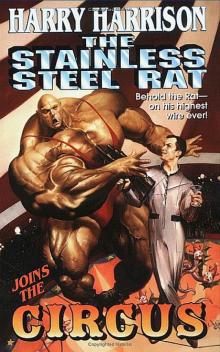 The Stainless Steel Rat Joins the Circus ssr-11
The Stainless Steel Rat Joins the Circus ssr-11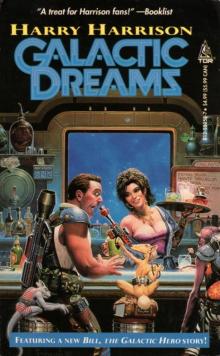 Galactic Dreams
Galactic Dreams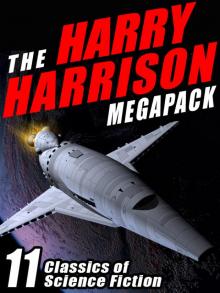 The Harry Harrison Megapack
The Harry Harrison Megapack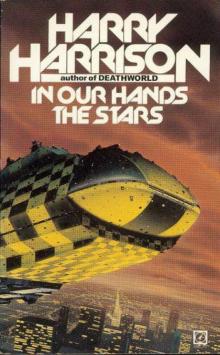 In Our Hands the Stars
In Our Hands the Stars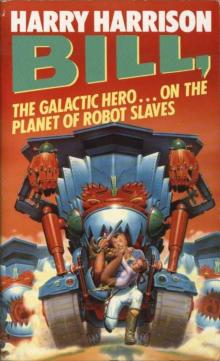 On the Planet of Robot Slaves
On the Planet of Robot Slaves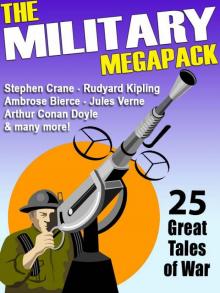 The Military Megapack
The Military Megapack Make Room! Make Room!
Make Room! Make Room! Wheelworld
Wheelworld Winter in Eden e-2
Winter in Eden e-2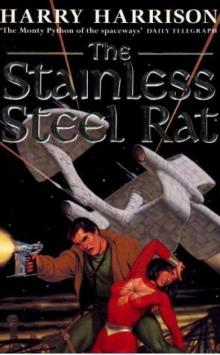 The Stainless Steel Rat
The Stainless Steel Rat The Stainless Steel Rat Goes to Hell
The Stainless Steel Rat Goes to Hell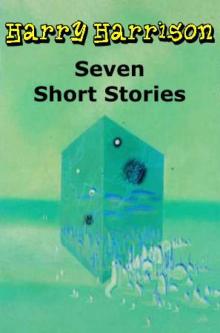 Harry Harrison Short Stoies
Harry Harrison Short Stoies Stainless Steel Rat 11: The Stainless Steel Rat Returns
Stainless Steel Rat 11: The Stainless Steel Rat Returns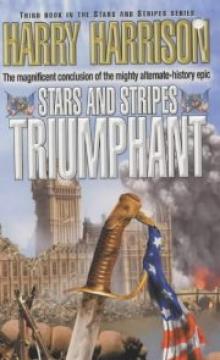 Stars and Stripes Triumphant sas-3
Stars and Stripes Triumphant sas-3 West of Eden
West of Eden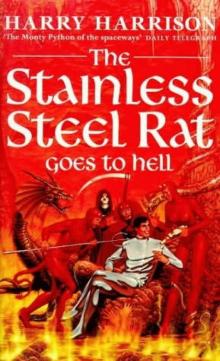 The Stainless Steel Rat Go's To Hell
The Stainless Steel Rat Go's To Hell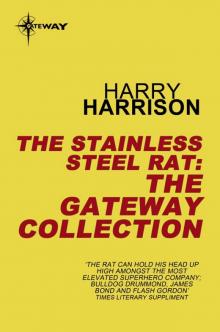 The Stainless Steel Rat eBook Collection
The Stainless Steel Rat eBook Collection Lifeboat
Lifeboat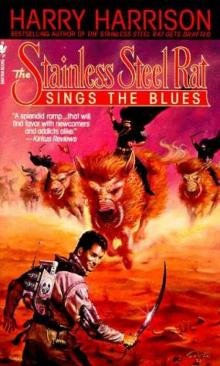 The Stainless Steel Rat Sings the Blues
The Stainless Steel Rat Sings the Blues Deathworld tds-1
Deathworld tds-1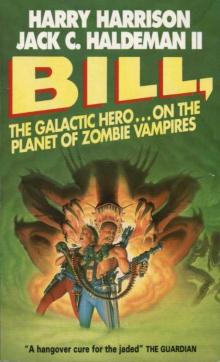 On the Planet of Zombie Vampires
On the Planet of Zombie Vampires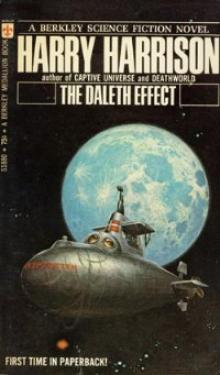 The Daleth Effect
The Daleth Effect On The Planet Of The Hippies From Hell
On The Planet Of The Hippies From Hell The Turing Option
The Turing Option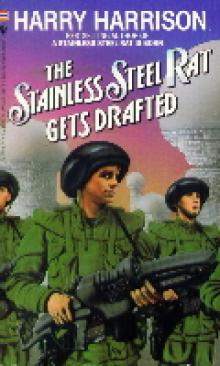 The Stainless Steel Rat Gets Drafted
The Stainless Steel Rat Gets Drafted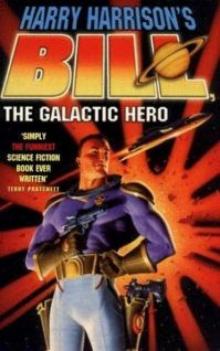 Bill, the Galactic Hero btgh-1
Bill, the Galactic Hero btgh-1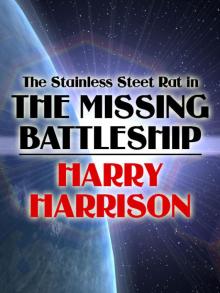 The Stainless Steel Rat in The Missing Battleship
The Stainless Steel Rat in The Missing Battleship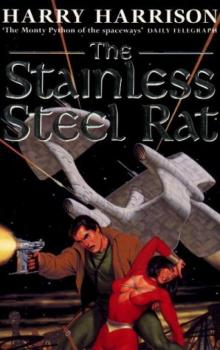 The Stainless Steel Rat ssr-1
The Stainless Steel Rat ssr-1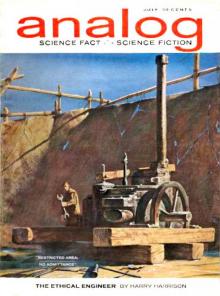 The Ethical Engineer (the deathworld series)
The Ethical Engineer (the deathworld series)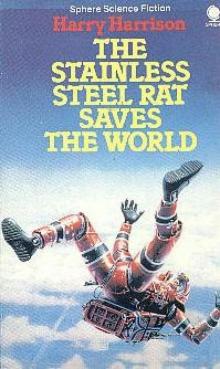 The Stainless Steel Rat Saves the World ssr-3
The Stainless Steel Rat Saves the World ssr-3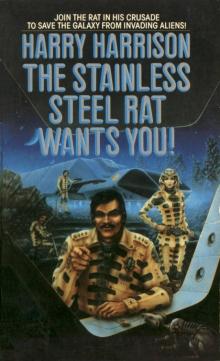 The Stainless Steel Rat Wants You
The Stainless Steel Rat Wants You One King's Way thatc-2
One King's Way thatc-2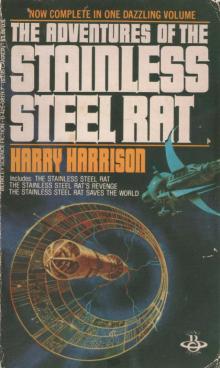 The Stainless Steel Rat Saves The World
The Stainless Steel Rat Saves The World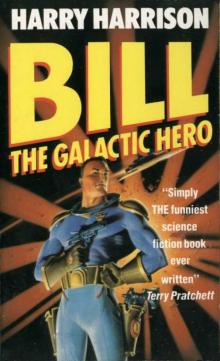 Bill, the Galactic Hero
Bill, the Galactic Hero Stars & Stripes Forever
Stars & Stripes Forever Stars and Stripes In Peril sas-2
Stars and Stripes In Peril sas-2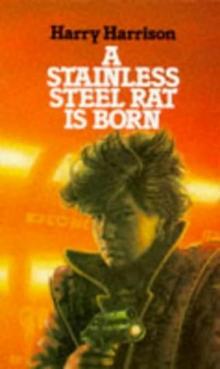 A Stainless Steel Rat Is Born ssr-6
A Stainless Steel Rat Is Born ssr-6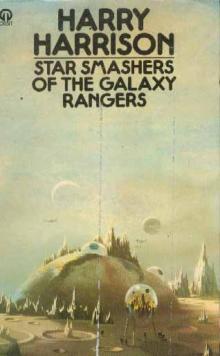 Star Smashers of the Galaxy Rangers
Star Smashers of the Galaxy Rangers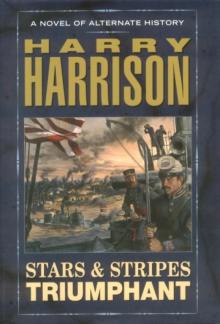 Stars & Stripes Triumphant
Stars & Stripes Triumphant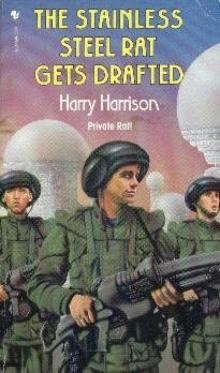 The Stainless Steel Rat Gets Drafted ssr-7
The Stainless Steel Rat Gets Drafted ssr-7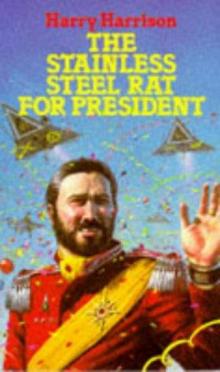 The Stainless Steel Rat for President ssr-5
The Stainless Steel Rat for President ssr-5 The Hammer & the Cross
The Hammer & the Cross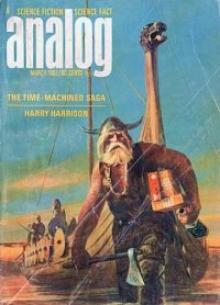 The Technicolor Time Machine
The Technicolor Time Machine The Hammer and The Cross thatc-1
The Hammer and The Cross thatc-1 King and Emperor thatc-3
King and Emperor thatc-3 Return to Eden
Return to Eden The Stainless Steel Rat’s Revenge ssr-2
The Stainless Steel Rat’s Revenge ssr-2 West of Eden e-1
West of Eden e-1 Return to Eden e-3
Return to Eden e-3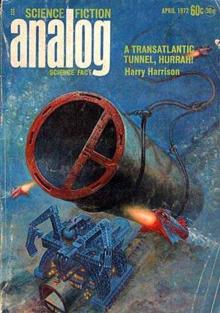 A Transatlantic Tunnel, Hurrah!
A Transatlantic Tunnel, Hurrah! Stars and Stripes Forever sas-1
Stars and Stripes Forever sas-1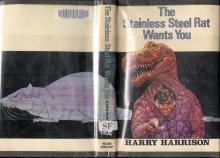 The Stainless Steel Rat Wants You ssr-4
The Stainless Steel Rat Wants You ssr-4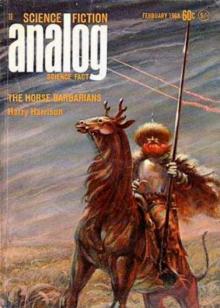 The Horse Barbarians tds-3
The Horse Barbarians tds-3 Planet of the Damned and Other Stories: A Science Fiction Anthology (Five Books in One Volume!)
Planet of the Damned and Other Stories: A Science Fiction Anthology (Five Books in One Volume!)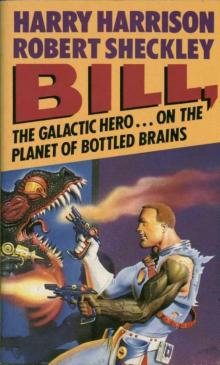 On the Planet of Bottled Brains
On the Planet of Bottled Brains Stars And Stripes In Peril
Stars And Stripes In Peril The Stainless Steel Rat's Revenge
The Stainless Steel Rat's Revenge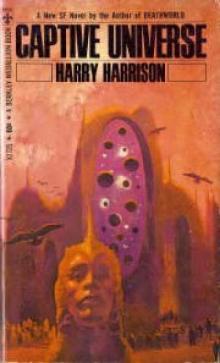 Captive Universe
Captive Universe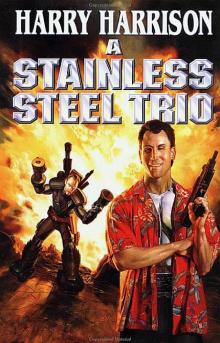 The Stainless Steell Rat Sings the Blues ssr-8
The Stainless Steell Rat Sings the Blues ssr-8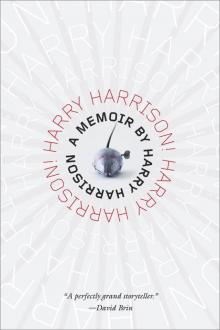 Harry Harrison! Harry Harrison!
Harry Harrison! Harry Harrison! Winter in Eden
Winter in Eden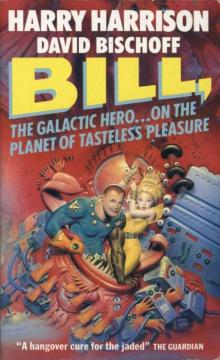 On the Planet of Tasteless Pleasures
On the Planet of Tasteless Pleasures